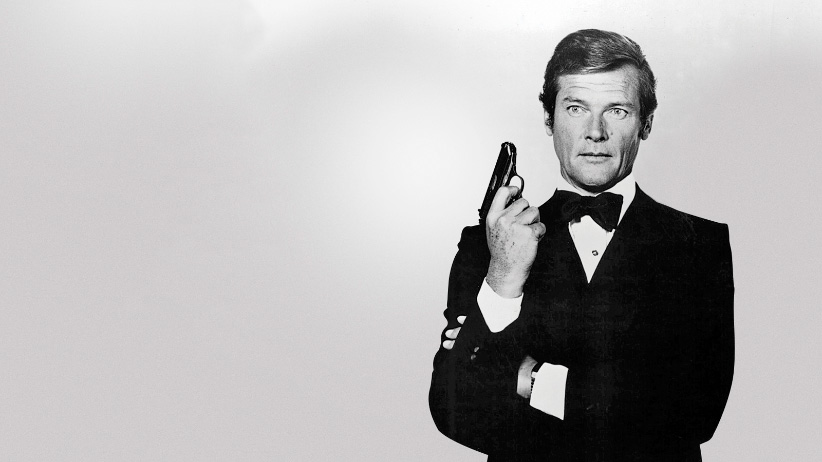Remembering Roger Moore
I never cared much for Roger Moore the first time I saw him in a Bond film. I can’t remember if it was Octopussy or Moonraker, but whichever picture, I thought his arched eyebrow and cultured diction something of a joke. He wasn’t serious,and I thought that James Bond ought to be serious. For years, I celebrated Sean Connery and Daniel Craig (men who showcased James Bond’s violence and coldness) instead of Roger Moore, but I was wrong. Very wrong. Luckily, during our Retrospective of the James Bond 007 series in 2015, I realized my error.
However fun it is comparing Bond actors to each other, it’s a silly endeavour as all the actors have succeeded in the role. Beyond that, an actor like Roger Moore, who died Tuesday at the age of 89 after a short battle with cancer, was a one-of-a-kind performer. He might have shared the Bond role with five other men, but he had more fun in it than anyone else has,and likely ever will.
My brothers and I have gone over Roger Moore’s contributions to the role of James Bond in the past so I don’t want to belabour his individual approach to the character, but it will forever remain the role that defines him. I don’t think he would’ve minded this. Unlike Connery, Moore never shied away from the role, and even though he acknowledged its silliness, he never disavowed himself of the franchise. In fact, in the 30 years that followed his passing the torch to Timothy Dalton, he acted as a gracious elder statesman, offering advice to each new actor in the role and taking part in any interviews or celebrations of the franchise that came his way.
Obviously his heart was dedicated to other pursuits, such as his family life and his role as a UNICEF Ambassador championing children the world over, but he never forgot that the vast majority of people remembered him as James Bond and that he was beloved because of his tenure in the role. Stories like this one from fan Marc Haynes highlight how gracious he was to fans who appreciated him for his role as Bond, and that he was never above playing the part in real life to make a person’s day. While he did have other notable roles, most importantly Simon Templar in The Saint during the late sixties, James Bond was Roger Moore’s crowning achievement.
He was funny. That is undeniable. No other Bond relished a punchline like Moore did, nor had such impeccably dry comedic timing. He also was impossibly stylish, which might go unnoticed nowadays since seventies fashion has fallen out of vogue. Watching him walk down the streets of Harlem in Live and Let Die or don a tuxedo with bell bottoms and command the space with such confidence and ease is impressive. He was a suave man and completely unflappable. Connery might’ve been cold and calculating, but Moore rarely seemed to break a sweat, and even when he did, he deflated any panic with a well-timed quip.
It’s often said that Moore understood the unrealistic nature of the Bond films better than any other actor. He certainly did. First of all, he was a professional actor and James Bond is not a real person. He understood the films were entertainment, first and foremost. Secondly, his films had the most outlandish plots in the series. Moore never tried to disguise the fact that real life supervillains rarely owned private space stations or operated from underwater layers where they dispatched their steel-toothed henchman.
However, instead of disregarding the unreality of the situations and playing the character entirely straight or serious, he opted to incorporate the fantasy into the character. But he didn’t turn Bond into a caricature. Instead, he turned him into a gentleman’s guide to the fantastic. He played the character like he was vaguely aware of the audience watching him, guiding them along these fantastic situations, always putting his position as entertainer first.
Not that his Bond didn’t take anything seriously. People underrate his capacity for danger or emotional depth, especially in films like For Your Eyes Only and The Spy Who Loved Me. It’s just that his showmanship was always his greatest asset. He knew how to carry a film and command a viewer’s attention, even in something as lumbering as A View to a Kill where he was too old for the role and the plot was a half-baked rehash of previous films. He might not have been Ian Fleming’s definition of the part (or many fan’s definition for that matter), but he was a great James Bond. This shouldn’t be up for debate anymore. The jury has made its verdict and the appeals court upheld it. Moore was the gentleman’s Bond, the unabashed romancer, the courtier, the charmer—yes, even the jester.
Roger Moore lived a long and remarkable life. His loss is not a tragedy, but it does rob us of a charismatic man capable of levity in a time when deft humour in films (and in the world) is in short supply. I’ll miss Roger Moore, but I’m glad that film will preserve him into the future.
RIP Roger Moore (1927-2017)
